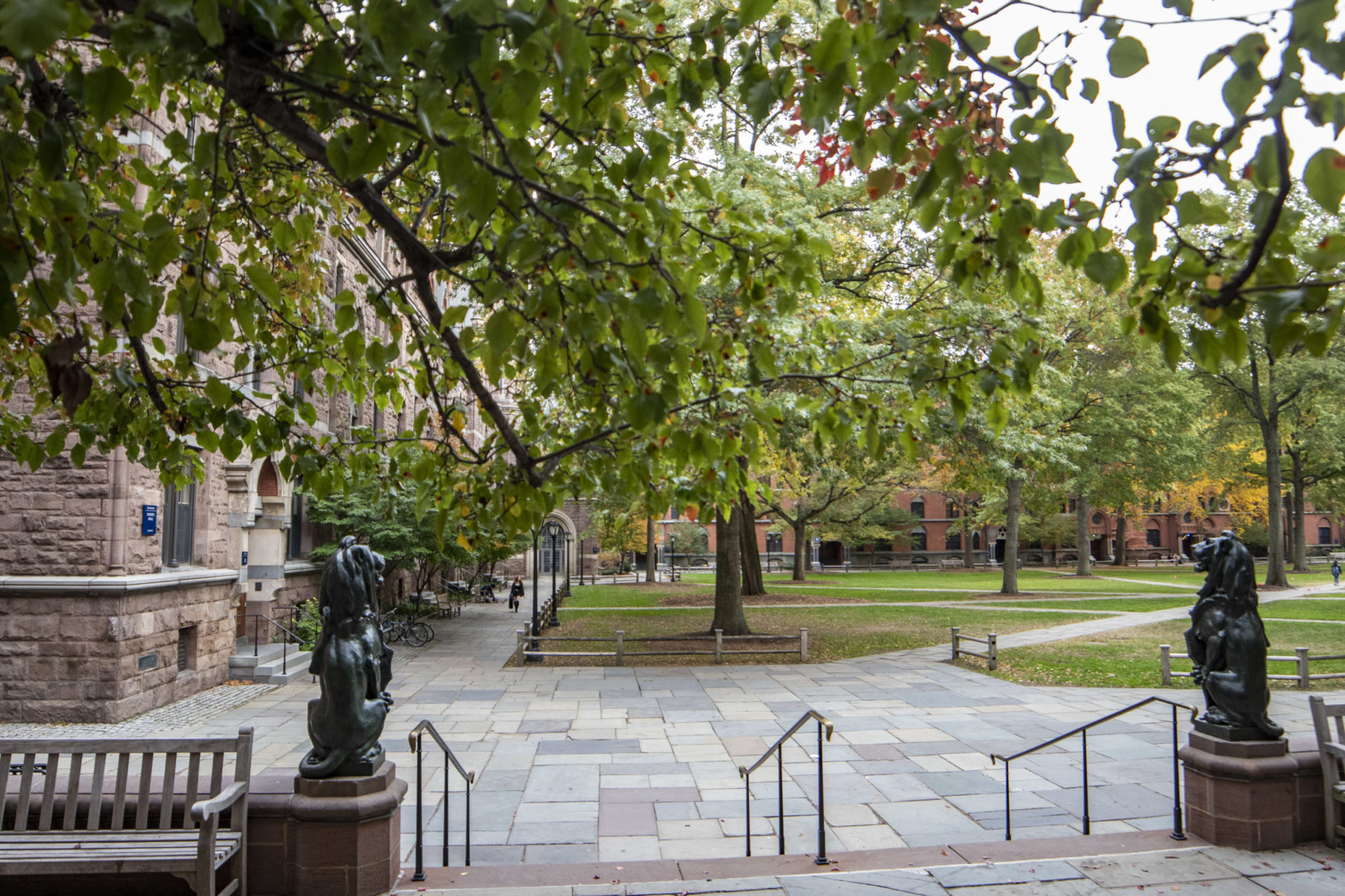
Zoe Berg/Photo Editor
With the class of 2024 living in their residential colleges, on-campus sophomores have found an unlikely home in the Lanman-Wright Hall courtyard on Old Campus.
Although Old Campus typically houses first-years, COVID-19 has rendered it the center of sophomore life. Some juniors also live on Old Campus. Current residents of Old Campus receive their COVID testing at Dwight Hall, pick-up food from their college dining hall and hang out with their peers in the courtyard. Now, almost a month into the semester, that routine is subject to change — Benjamin Franklin, Pauli Murray, Silliman and Timothy Dwight colleges are offering their students the chance to move back behind college gates.
“Some [students] may be moving back into their residential colleges — but only the residential colleges that typically include first year students in the colleges proper,” wrote Grace Hopper Head of College and Chair of the Council of Heads of Colleges Julia Adams in an email to the News. “These are Franklin, Murray, TD and Silliman — and this is entirely an issue of space.”
According to Adams, leaving Lanman-Wright is not mandatory. Rather, students can decide for themselves whether moving is right for them.
Camden Rider ’23 is a sophomore in Murray who petitioned to live on campus for mental health reasons and to mitigate the time difference between New Haven and his home on the West Coast. According to Rider, this new opportunity was given in hopes of strengthening sophomores’ ties with their colleges. This reason has not yet been confirmed by a head of college.
Rider said he appreciates his head of college’s concern for sophomores’ connection to the college and for their schedule. Since students can only retrieve food from their own college’s dining hall, the 1.2 mile walk from Lanman-Wright Hall to Pauli Murray and back has posed an issue for many students trying to eat between classes and other commitments. However, he plans on staying where he is.
“I have a good group of people around me and wasn’t ready to move across campus,” Rider said. “I emailed [my head of college] back saying all this and that I’m good where I am. I don’t feel detached from the Murray community — I have a community — I’m doing well.”
Not all sophomores share this feeling of connection to their residential college. Dan Huynh ’23 is living on campus because of his membership in Yale’s Naval ROTC program. Though living and training together has enabled him to maintain rapport with the ROTC crowd, his other main point of connection — Trumbull, his residential college — has weakened.
Huynh cites the difficulty of eating in the dining halls, the lack of residential college programming and the fact that many of his friends are scattered across the globe as sources of strain.
Some of the on-campus sophomores are transfer students navigating their first semester in New Haven in the midst of the pandemic. These students in particular report feeling a disconnect between themselves and the broader Yale community.
Grace Campos ’23, who transferred to Yale from Pomona College in California to take advantage of Yale’s undergraduate theater program noted that, aside from some Zoom calls, there has not been an orientation program for transfer students. While the class of 2024 gets first-year counselors, mixers and extracurricular recruitment, transfer students have had to fend for themselves, Campos said.
According to Campos, transfer students have a transfer counselor, similar to the FroCos first-year students have. Despite this, many transfer students have not had much contact with their transfer counselors due to many of the counselors taking a leave of absence this year.
“Yale’s priority is always going to be its first-years — it felt like we were kind of left to the dust,” Campos said.
Sophomores at Yale — even prior to the pandemic — lose formal sources of mentorship like FroCos just as they are supposed to begin narrowing the focus of their college careers. Yale College students are expected to declare a major by the end of their sophomore year.
Rider expressed similar sentiments. According to Rider, the support first year students receive disappears once they reach their sophomore year of college.
A lack of external guidance and a pandemic has forced sophomores to look inwards and build a community within their class. According to Rider, the eclectic mix of on-campus sophomores ranges from ROTC members to internationals to transfer students who likely would not have met if it had not been for the pandemic.
“In the beginning, there was this presumption that everybody else knew each other and the transfers didn’t know anyone, but it became apparent that that wasn’t that case,” Campos said.
Campus, who was originally nervous about entering a system of pre-existing relationships, came to realize that most sophomores were forging new friendships in the face of the pandemic.
Huynh thinks the administration chose to house sophomores in Lanman-Wright Hall because the building’s courtyard is conducive to community building while also complying with the University’s guidelines for social distancing.
“The first 14 days when we couldn’t go to our residential colleges were just peak sophomore unity because we’d have to pick up our food on Old Campus and then we’d all eat together in the courtyard,” Huynh said. “That’s how I got to know most of the people who are new to me.”
Lanman-Wright Hall is located at 206 Elm St.
Jordan Fitzgerald | jordan.fitzgerald@yale.edu







